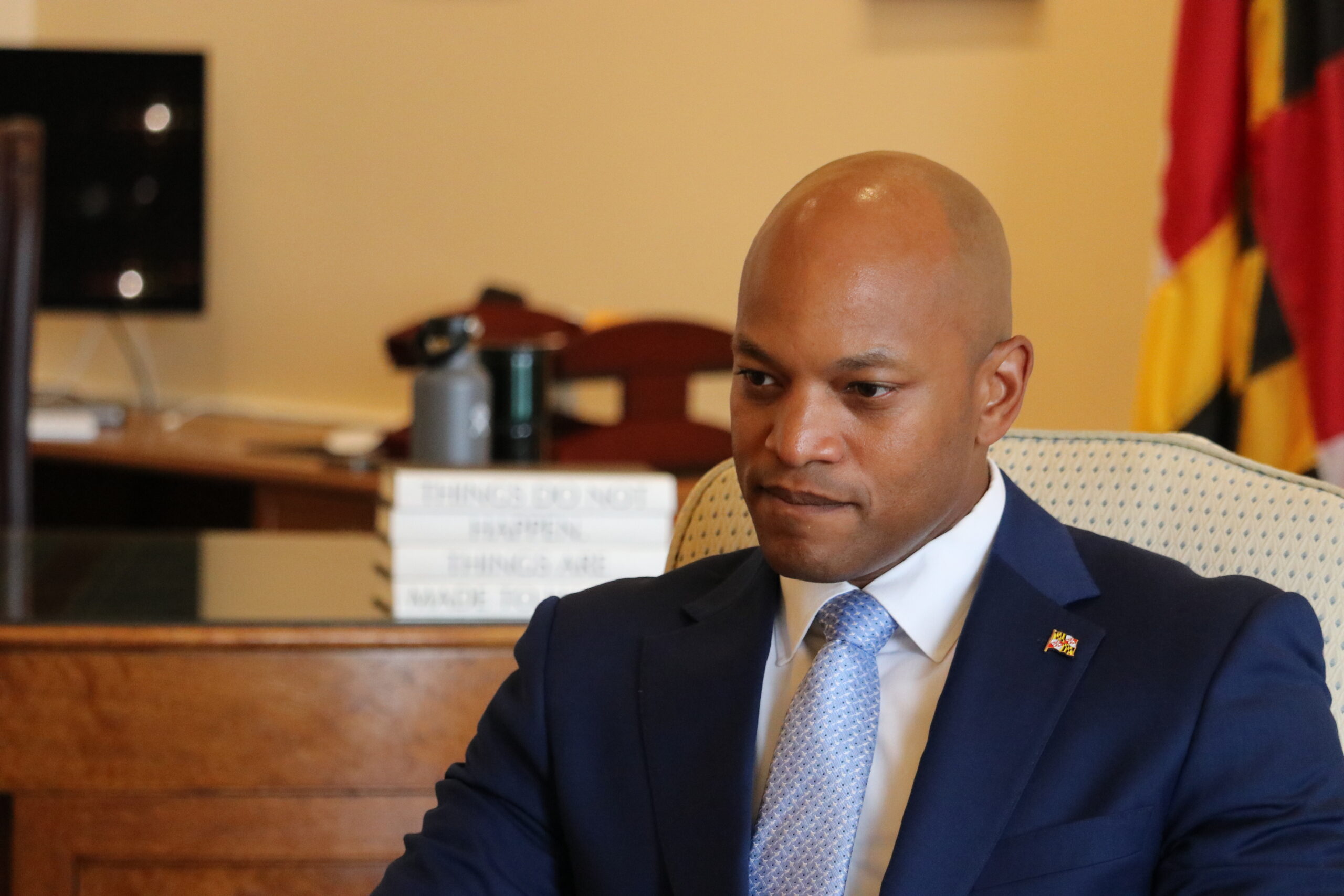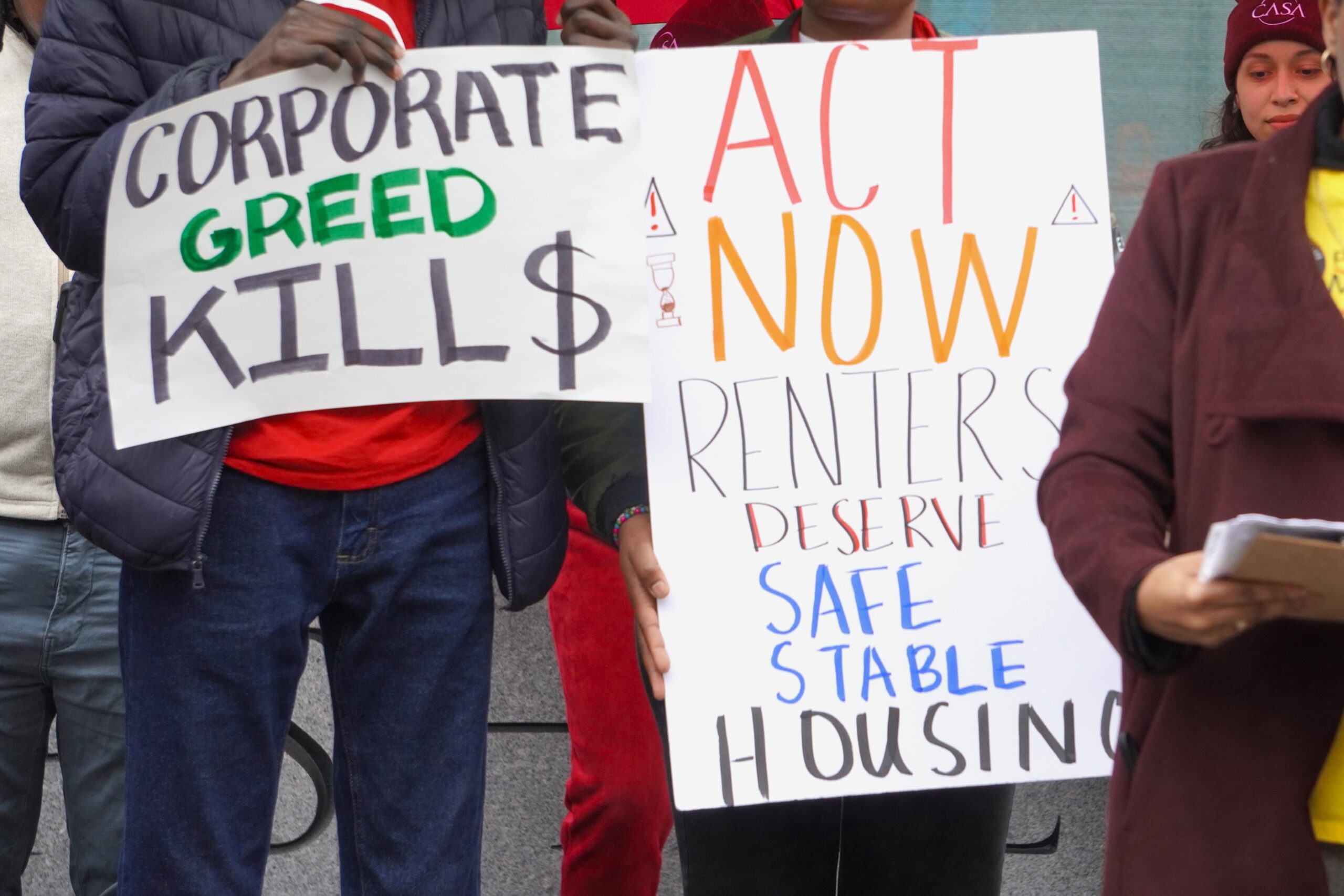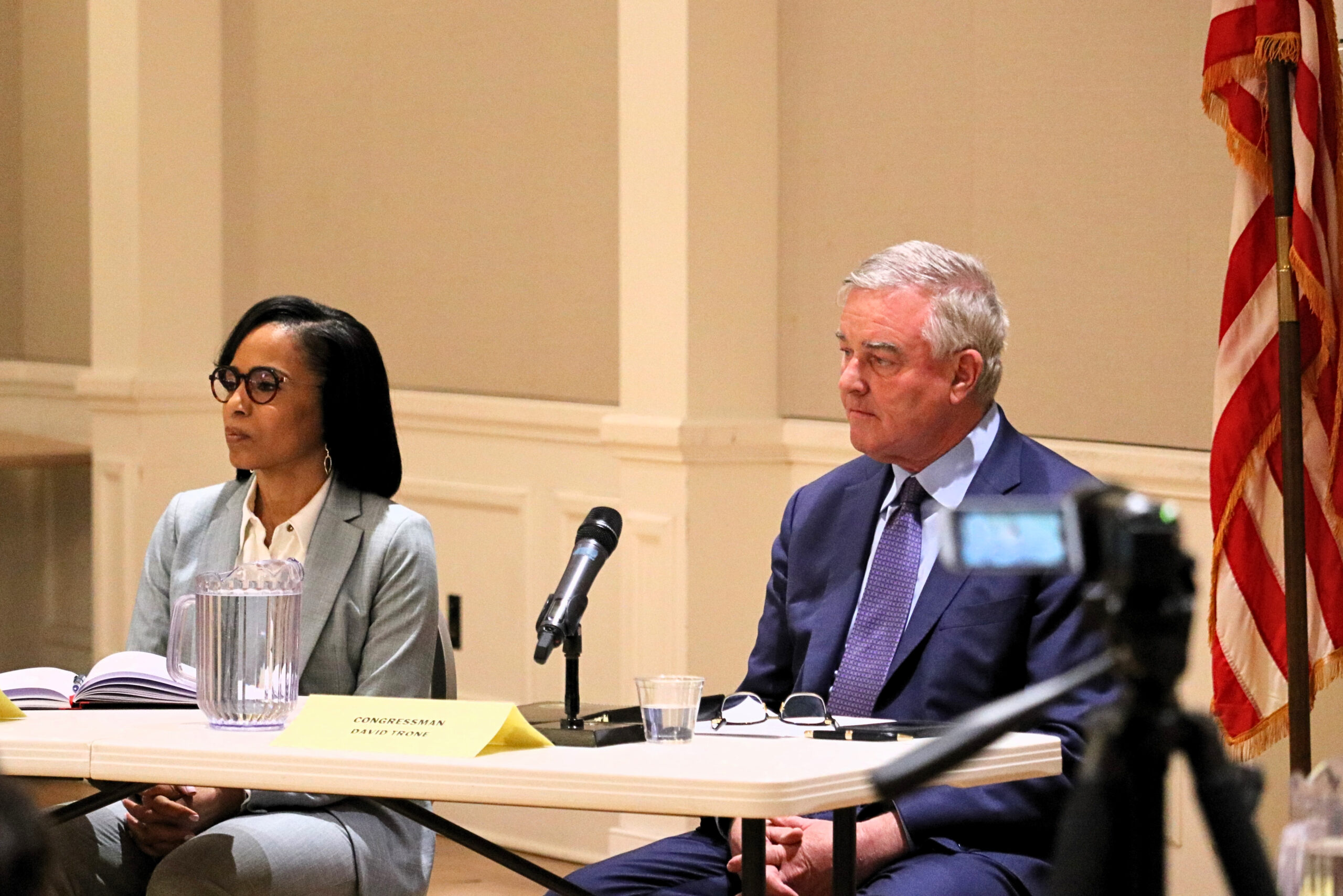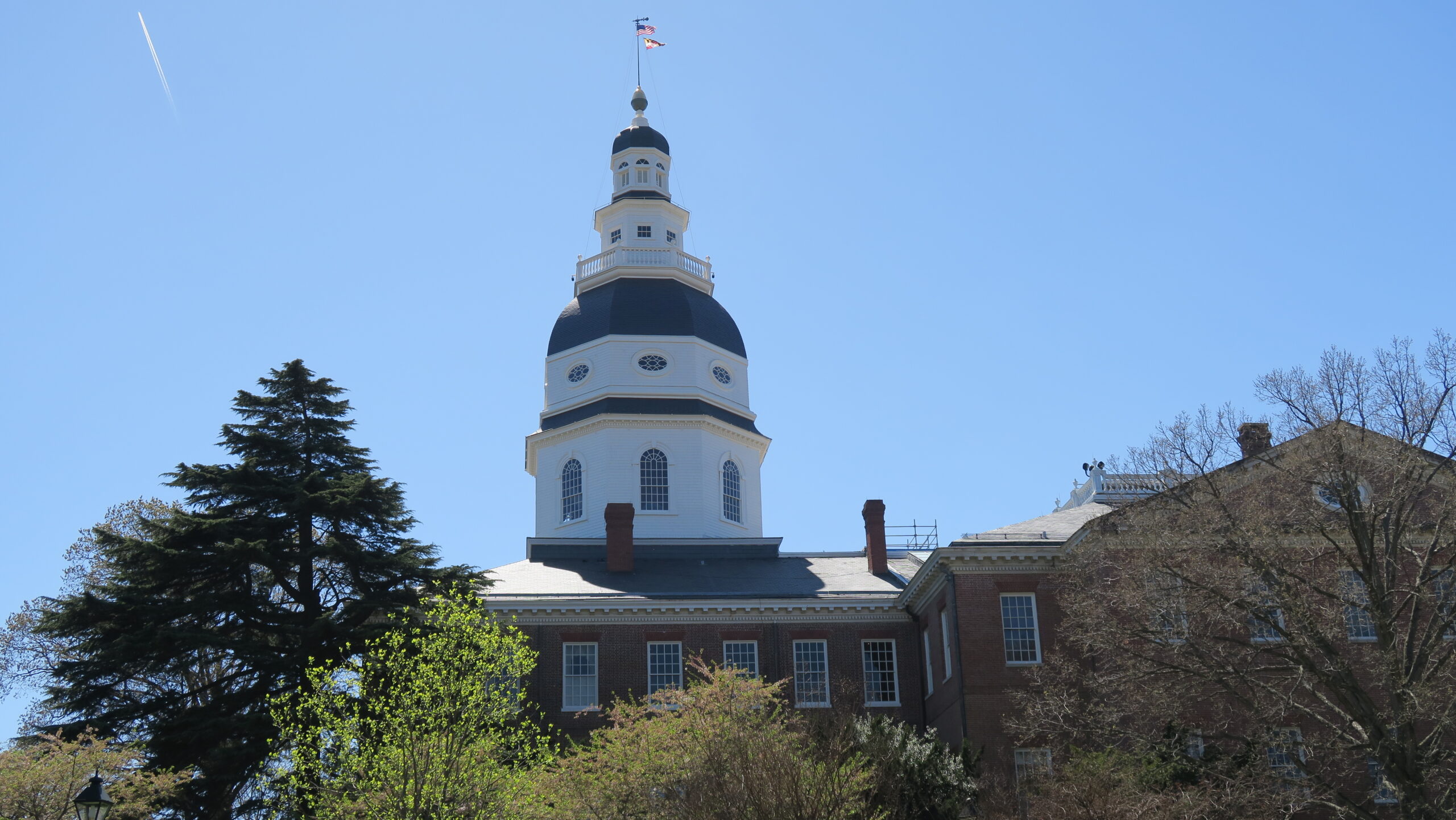The Almanac of American Politics on Moore: A charismatic leader who broke barriers as a political outsider

Editor’s Note: Today, as Gov. Wes Moore (D) marks six months in office, Maryland Matters offers a preview of the newest edition of the Almanac of American Politics, the classic political reference book for political junkies.
This profile of Moore was written by Louis Peck, contributor to the Almanac and co-founder of Maryland Matters.
***
More than a year prior to the 2022 primary election, Democrat Wes Moore launched his campaign for Maryland governor as a political outsider who had never before sought elected office. Early polls put him in the low single digits.
But Moore succeeded in combining a compelling resume — Rhodes scholar, Afghanistan War veteran, best-selling author and CEO of a large anti-poverty foundation — with a charismatic personality and a stump style to match to lead a crowded Democratic gubernatorial primary field: His opponents included two former U.S. Cabinet secretaries and a long-time Maryland statewide official who had held elected office for almost as long as Moore had been alive. In November, Moore overwhelmed a Republican candidate closely aligned with former President Donald Trump to be elected as the state’s 63rd governor — as well as the first Black person chosen for the top job in Annapolis.
How did Moore successfully make the jump from political outsider? “He put together an expert campaign team that focused on the fundamentals that it takes to win elections — and that core fundamental is raising money,” said Goucher College political science professor Mileah Kromer. “The first big stories that came about Moore when the campaign season heated up were that he was a formidable fundraiser.” The Rolodex generated by Moore’s resume — which also included stints as an investment banker and head of a TV production firm — resulted in an eye-popping fundraising haul of $4.8 million when the first disclosure reports were filed in early 2022. That far outdistanced the two former Obama Cabinet members in the contest: ex-Labor Secretary Tom Perez, also a former Democratic National Committee chair, who took in $2.7 million for the same period, and ex-Education Secretary John King, who raised $2.5 million.
Capitalizing on Moore’s financial advantage and his biography, his campaign consultants — the national firm of SKDK Knickerbocker, long headed by Anita Dunn, a top adviser to President Joe Biden — “turned that very quickly into a positive message that really resonated with a lot of the state’s residents,” Kromer added. (Closer to home, political novice Moore also could draw upon the counsel of an insider: his wife, Dawn Flythe Moore, who worked in Maryland government and politics before marrying him in 2007, and who subsequently became an entree for her husband in state political circles). Endorsements from the state Democratic Party establishment, including three members of its congressional delegation — then-House Majority Leader Steny Hoyer, the longest serving member of that chamber, notably among them — and the two top leaders of the Maryland General Assembly, added momentum.
Moore is only the third Black person to win a gubernatorial election in the United States since the post-Civil War Reconstruction Era, and, at 44, quickly become the subject of speculation as a future presidential contender. “Wes Moore has never been elected to anything. Some backers are already eyeing the White House,” read the headline of a story in Politico that ran a month before the November 2022 election. For his part, Moore has sought to put a lid on such speculation — saying that he plans to serve the eight years in Annapolis allowed by the state constitution, and reiterating this by frequently declaring on the stump, “This is truly going to be Maryland’s decade.”
Throughout the campaign, Moore downplayed the precedent-setting prospect of his election. “We’re not running to make history,” he said repeatedly. “We have a unique opportunity to make child poverty history. We have a unique opportunity to make the racial wealth gap history.” It tied into his campaign slogan: “Leave no one behind.”
Moore’s candidacy marked the third straight gubernatorial election in which Democrats had run a Black nominee in Maryland — a state in which nearly one-third of the population is Black, as is an estimated 40 percent of the Democratic primary electorate. In 2014, Anthony Brown — then lieutenant governor — was hampered by a difficult Democratic environment nationally as well as what was widely criticized as a poorly run campaign; he was upset by Republican Larry Hogan, who won in the overwhelmingly blue state with a platform that combined fiscal conservatism and social pragmatism. (Brown himself made history in 2022, winning election as Maryland’s first Black attorney general after serving for six years in Congress.)
In 2018, Hogan was easily reelected after Democrats nominated former NAACP President Ben Jealous, who was tied to the party’s progressive wing. “Moore was different from Jealous in that Moore’s major political gift is that he never comes off as an ideologue,” said Kromer, who runs Goucher College’s statewide political polling operation. “Moore has a message that’s so broadly appealing that he speaks to the moderate base of Black voters. Jealous was just more progressive than the average Black voter was.”
In fact, Moore was regularly described as a centrist or moderate. While he has proposed several expansively liberal initiatives to deal with economic inequities — such as a “baby bonds” program that would deposit an amount based on family income into an account for each baby born — Moore has brushed aside the need for tax increases to underwrite his proposals.“It’s not about raising taxes,” he said during an appearance on Fox News Sunday after his election. “The capital is out there. We need to be smarter about applying it.” He later told the Washington Post that he wants to examine elimination of the estate or inheritance tax to make Maryland more attractive to retirees.
To be sure, Moore’s first foray into politics was not without its share of bumps — including suggestions during both the primary and general election campaigns that aspects of his resume had been embellished. Perhaps most notable was the controversy surrounding elements of his best-selling 2010 book, “The Other Wes Moore: One Name, Two Fates,” which related Moore’s own story along with that of a man of the same name and similar age from Baltimore who is serving a life sentence for killing a police officer. For years, the dust jacket blurb and promotional materials for the book — an examination of the impact of educational opportunity and economic inequities on a person’s success or failure — read: “Two kids named Wes Moore were born blocks apart within a year of each other.” It led to a widespread but false belief that Moore was a Baltimore native.
Moore said the mistake had been made by his publisher, and that he had asked it be corrected. His campaign went so far as to ask state prosecutors during the primary campaign to investigate the origins of an anonymous dossier that questioned aspects of his life’s story. “I have nothing to exaggerate about my life,” Moore declared to the Post.
Formally Westley Watende Omari Moore, the future governor was actually born in the Washington, D.C. suburb of Takoma Park. (Coincidentally, Takoma Park is the longtime residence of the two candidates who ended up being Moore’s leading rivals in the 2022 Democratic primary: Perez and Peter Franchot, who had served for 16 years as state comptroller after two decades in the Maryland House of Delegates.) Moore was just three years old when his father, a news anchor for a Washington radio station, died in front of him due to a misdiagnosed case of acute epiglottitis, a rare virus that causes the air passages to the lungs to shut down. Moore’s mother, an immigrant from Jamaica, moved him and his two sisters to live with her parents in the New York City borough of the Bronx. The area of the Bronx in which they resided was beleaguered by crime and drug use, prompting Moore’s mother, Joy Moore, to work several jobs so he could enroll at Riverdale Country School, a private school located in the Bronx’s most prosperous section.
During his time at the school, Moore was a C student with behavior problems — prompting his mother to enroll him in Pennsylvania’s Valley Forge Military Academy when he was 12; her parents mortgaged their house to help pay the tuition. At first, Moore was miserable and begged to come home, but his seven years at Valley Forge put him on the trajectory for a successful and multifaceted career. He rose to become first captain in command of 800 cadets at Valley Forge, and graduated from the school in 1998 with an associate’s degree. He went on to earn his bachelor’s degree at Johns Hopkins University, making him a Baltimore resident for the first time. He won a Rhodes scholarship, which culminated in a master’s in international relations from Oxford University three years later.
Commissioned as a second lieutenant upon graduation from Valley Forge, Moore remained with the Army Reserve until 2014. In 2005, he was called to active duty, serving with the 82nd Airborne Division in Afghanistan and achieving the rank of captain. Included in Moore’s initial legislative package upon being sworn in as governor was an increased tax break for military veterans, for which he testified in person before a House of Delegates committee.
After completing his tour of duty in Afghanistan, Moore became a White House fellow at the State Department, then spent five years in New York as an investment banker with Citibank. During this period, he published “The Other Wes Moore” and started his own production company that generated programming for several TV networks, including the Oprah Winfrey Network — where he hosted a show for a time — and PBS. (Winfrey, a onetime local TV news anchor in Baltimore, helped to push “The Other Wes Moore ’ onto bestseller lists in 2010 and, more than a decade later, delivered an influential endorsement of Moore in the closing weeks of the primary.) From 2017 to 2021, Moore served as CEO of the Robin Hood Foundation, a large charitable organization that seeks to address poverty in New York City through funding numerous non-profit groups. During this period, Moore was urged to run for mayor of Baltimore and, later, for Congress after the 2019 death of Rep. Elijah Cummings, but he demured.
Early polling after Moore entered the gubernatorial race showed Franchot and former Prince George’s County Executive Rushern Baker — who had run for governor four years earlier — as the initial frontrunners, largely due to name identification from previous statewide runs. But on the heels of Moore’s impressive fundraising haul in early 2022, he received a key endorsement in March from Baker’s successor as Prince George’s executive, Angela Alsobrooks. This helped Moore consolidate support in the majority-Black county, the second most populous in the state. It also dealt a severe blow to Baker’s hopes; he was forced to suspend his campaign prior to the July primary due to lack of funds.
Former Education Secretary King, the third Black candidate in the primary beyond Moore and Baker, picked up support from several progressive groups but never gained traction, finishing sixth in the 10-candidate field. “The race shaped up very quickly into a dynamic where you had Peter Franchot still very formidable, but then Wes Moore and Tom Perez had the momentum in their campaigns,” Kromer said. However, Franchot struggled throughout the contest to expand his base of support, hampered in part by his years-long attacks on the state’s Democratic Party establishment as the “Annapolis Machine.” Perez, as a former U.S. Labor secretary, enjoyed the support of most of the state’s unions, though Moore picked up the coveted endorsement of the teachers’ union, the Maryland State Education Association. Ultimately, Moore edged out Perez, 32%-30%, a margin of about 15,000 votes statewide. Franchot finished in third place with 21 percent.
As Democrats and their union allies united around Moore for the general election, the Trump-endorsed candidate, state Del. Dan Cox, emerged from the Republican primary, defeating the Hogan-backed contender, former Maryland Commerce Secretary Kelly Schulz, 52%-43%. Cox had labeled former Vice President Mike Pence a “traitor” for refusing to block the Electoral College selection of Joe Biden as president prior to the Jan. 6, 2021 storming of the U.S. Capitol, and a year earlier had sued Hogan over vaccine mandates at the height of the COVID pandemic. Hogan publicly dismissed Cox as a “Q’Anon whack job” and refused to support him in the general election.
Cox sought to move a few steps to the political center during the general election campaign, but to little effect.He tried to capitalize on concerns about the persistently high homicide rate in the city of Baltimore by accusing Moore of wanting to defund the police. Moore blunted the charge with his endorsement by the Maryland Fraternal Order of Police, whom he promised a seat at the table during his administration — to the discomfiture of some Democratic progressives. On Election Day, Moore overwhelmed Cox, 64.5%-32%, for the biggest landslide in a Maryland gubernatorial election in more than three decades. Combined with gains in the already overwhelmingly Democratic-controlled General Assembly, Moore’s victory provided him and state legislative leaders the opportunity to pursue a variety of economic, social and environmental proposals that had been stymied for eight years under divided government.
This month, the Almanac will be publishing its 2024 edition, with some 2,200 pages offering fully updated chapters on all 435 House members and their districts, all 100 senators, all 50 states and governors, and more.


